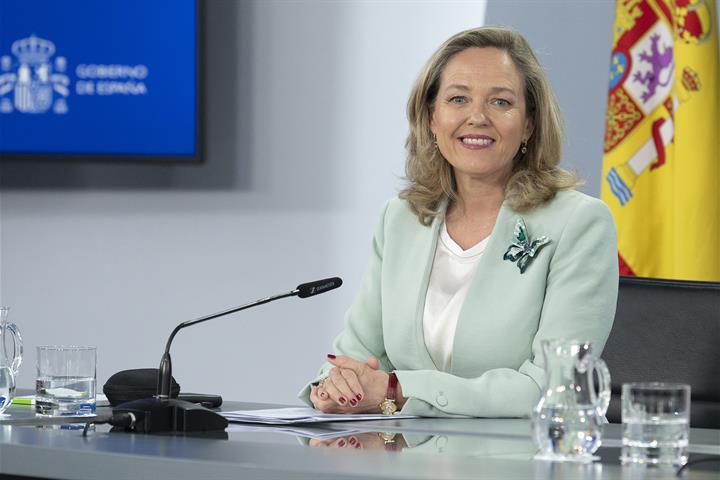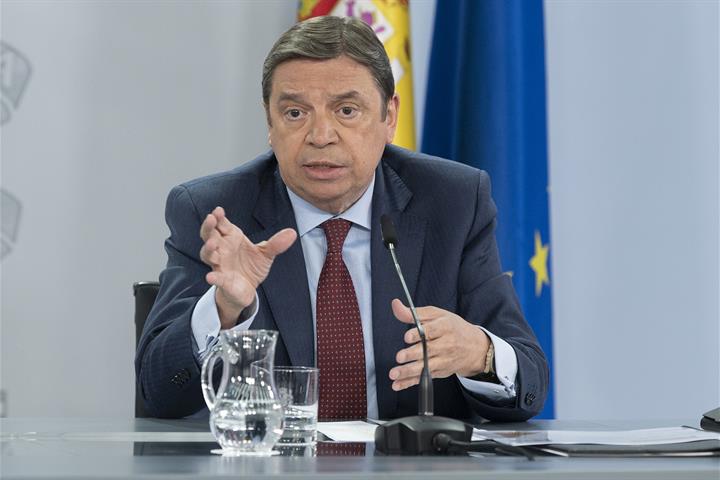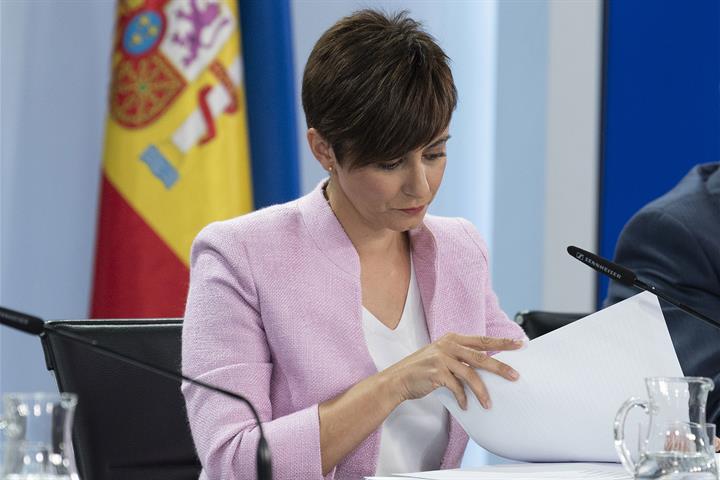The Government to mobilise up to 50,000 Sareb homes for social and affordable rentals
Council of Ministers - 2023.4.18
Moncloa Palace, Madrid
The Council of Ministers has presented the plan of the Sociedad de Gestión de Activos Procedentes de la Reestructuración Bancaria (Sareb), which will earmark up to 50,000 housing units for social and affordable rentals from its real estate portfolio and the transfer of land for development.
This initiative comes in addition to the actions envisaged in the State Plan for Access to Housing 2022-2023, including the Youth Rental Voucher and aid for refurbishment and energy efficiency, and aims to increase the public housing stock by 100,000 units.
The First Vice-President of the Government and Minister for the Economy and Digital Transformation, Nadia Calviño, outlined this strategy, previously announced by the President of the Government, Pedro Sánchez, last February in the Upper House of Parliament.
Calviño highlighted the government's triple objective since it took control of Sareb in April 2022: to promote the public housing stock, support social inclusion and improve structuring and cohesion throughout the national territory. All of this, "with the best possible use of public assets to manage them responsibly and look after taxpayers' money".
Sareb has a potential finished housing stock of 21,000 units, plus a further 14,000 inhabited units and land available for the development of up to 15,000 new homes.
Destination of Sareb's assets
 Pool Moncloa / Borja Puig de la Bellacasa
Pool Moncloa / Borja Puig de la Bellacasa
Nadia Calviño has advanced that to take advantage of these assets, the government has launched a three-pronged plan: the mobilisation of the 21,000 homes for social use, the proactive management of the 14,000 homes already inhabited and the transfer of land for development.
Social housing through agreements with communities and town councils
The 21,000 Sareb homes identified for social use will be mobilised through sale agreements with the autonomous communities for affordable social renting.
The first vice-president detailed that 9,000 are already available for sale, and 12,000 are awaiting the finalisation of the works or the certificate of habitability. Sareb has already negotiated sale agreements with the Community of Valencia and the Regional Government of Galicia, and is in negotiations with the City Council and the Community of Madrid, the municipalities of the metropolitan area of Barcelona, the Government of Catalonia, the Regional Government of Castilla y León and the City Council of Torrelavega (Cantabria).
Agreements are also envisaged for the temporary transfer of housing for social use, both to public administrations and non-profit organisations, paying special attention to areas at risk of depopulation and vulnerable groups.
By way of example, Calviño highlighted the agreements to make housing available to seasonal workers in the agricultural sector and to promote entrepreneurship and encourage young people to settle in rural areas, and also for the reception of refugees.
Proactive housing management and strengthening social inclusion
The strategy envisages the proactive management of the 14,000 housing units already inhabited. Nadia Calviño advanced that vulnerable families will be identified and will be offered the required support with "always prudent and responsible management of the asset portfolio". They will be offered rents that consider their income level, and they will be helped to regularise their situation in the search for employment, to access social services and to apply for the Minimum Basic Income (Ingreso Mínimo Vital).
Sareb is currently already managing more than 2,000 social rents and is supporting more than 400 families. The vice-president has argued that social renting contributes to recovering the value of assets by making it easier for tenants to be in a better position economically and therefore to pay their rents.
Transfer of land for development
The executive will also launch a project for the transfer of land for development through a public-private partnership scheme. The bank has land to build an additional 15,000 homes for affordable rentals.
Sareb will also offer public administrations the sale of land for other social purposes such as the construction of hospitals, schools and other public spaces.
Nadia Calviño pointed out that the sale of land assists the project led by the Ministry of Ecological Transition and the Demographic Challenge to tackle depopulation and implement business and reindustrialisation projects in rural Spain, in collaboration with private companies.
Sustainable irrigation
 Pool Moncloa / Borja Puig de la Bellacasa
Pool Moncloa / Borja Puig de la Bellacasa
The Council of Ministers discussed a report on sustainable irrigation policy in the framework of the Recovery, Transformation and Resilience Plan.
The Minister for Agriculture, Fisheries and Food, Luis Planas, has framed this report in the current moment, described as "particularly difficult from the hydrological and rainfall point of view". Planas pointed out that since 1 October, the start of the hydrological year, the amount of rainfall has fallen by 18.8% compared to previous years. The situation is worsening in the southern part of the peninsula, in particular in the Guadalquivir and Guadiana basins.
Regarding rainfed farming, the minister indicated that most farms will be able to sow and harvest, but will have a lower yield, which will be compensated for by the combined agricultural insurance. Other farmers, however, will be held back from cultivating by weather conditions and higher production costs, in particular for fertilisers. Precisely to alleviate this rise in prices, the government has just paid out a total of €281 million, which has reached 234,000 farmers, a support that Planas has described as "effective".
The situation is more complicated in the case of irrigation, which accounts for 65% of all plant production in Spain. The minister recalled just yesterday that the Guadalquivir Hydrographic Confederation's Commission for the Discharge of Water has reduced water allocations by up to 90%, "which undoubtedly endangers certain crops".
Luis Planas announced that the government is working on "short-term responses" pending the outcome of tomorrow's meeting of Mesa de la Sequía, and on possible national measures and in the context of the EU, with an eye on both the present and the future.
Modernisation and digitisation
As the Minister for Agriculture argued, the question "is not whether we should or should not irrigate", but rather how we can achieve "sustainable irrigation" which allows a level of production to continue that makes food autonomy and exports possible. This requires modernising irrigation to increase its efficiency and using other sources of water supply, such as recycled and desalinated water.
According to Luis Planas, the investments planned by the government to promote this modernisation in the period 2022-2027 total €2.13 billion, more than double the average for the first twenty years of this century. This amount includes €1.26 billion from the Recovery Plan and €875 million from the State Budget. The minister indicated that to these funds must be added €5 billion in works from the Ministry of Ecological Transition, and €200 million from the PERTE for the Digitalisation of the Water Cycle.
The objective is to cover 750,000 hectares, 200,000 hectares in first modernisation and 550,000 hectares in second and third modernisation. "You can always irrigate better; you can make better use of every drop of water," said Planas, who added that the goal is to reduce water consumption by at least 10%. To achieve this, 96 actions are envisaged in 15 autonomous communities, to be deployed in three phases and charged to the Recovery Plan.
Grants for NGDOs
 Pool Moncloa / Borja Puig de la Bellacasa
Pool Moncloa / Borja Puig de la Bellacasa
The Council of Ministers has authorised the Spanish Agency for International Cooperation and Development (AECID) to call for grants to be received by Non-Governmental Development Organisations (NGDOs) to carry out their projects in 2023.
The Minister for Territorial Policy and Government Spokesperson, Isabel Rodríguez, has specified that the amount of the subsidies totals €45 million, most of which comes from personal income tax collection, and will be allocated to areas such as gender equality, the fight against climate change and just transition, access to health, inclusive recovery and the promotion of human rights.
The spokesperson indicated that projects that act in single countries, which total 30, will be subsidised, as will initiatives that focus on several countries concerning fighting poverty from a human rights and fair-trade approach, and projects to meet the needs of the Sahrawi refugee population in Tindouf (Algeria).
Other agreements
The government has agreed to forward to parliament the Convention on Safety and Health in Construction, and has authorised the expression of Spain's consent to be bound by this convention.
Isabel Rodríguez said that this decision increases accident prevention and safety at work, and addresses issues relating to first aid and the welfare of workers. "With this new convention, Spain continues to lead the countries with the highest number of ratified conventions in the International Labour Organisation, thereby showing its commitment to the protection of workers".
The Council of Ministers has also approved the contracting of a new system for monitoring toxic gases in the towns of Puerto Naos and La Bombilla on the island of La Palma, which suffered the effects of the volcano's eruption.
In addition, the government has authorised the remodelling and extension work on the new headquarters of the World Tourism Organisation, which will be housed in one of the buildings of Madrid's Palacio de Congresos y Exposiciones.
It has also authorised the agreement to build the Riberas de Loiola interchange in San Sebastián, involving an investment of €35.9 million.
Non official translation




